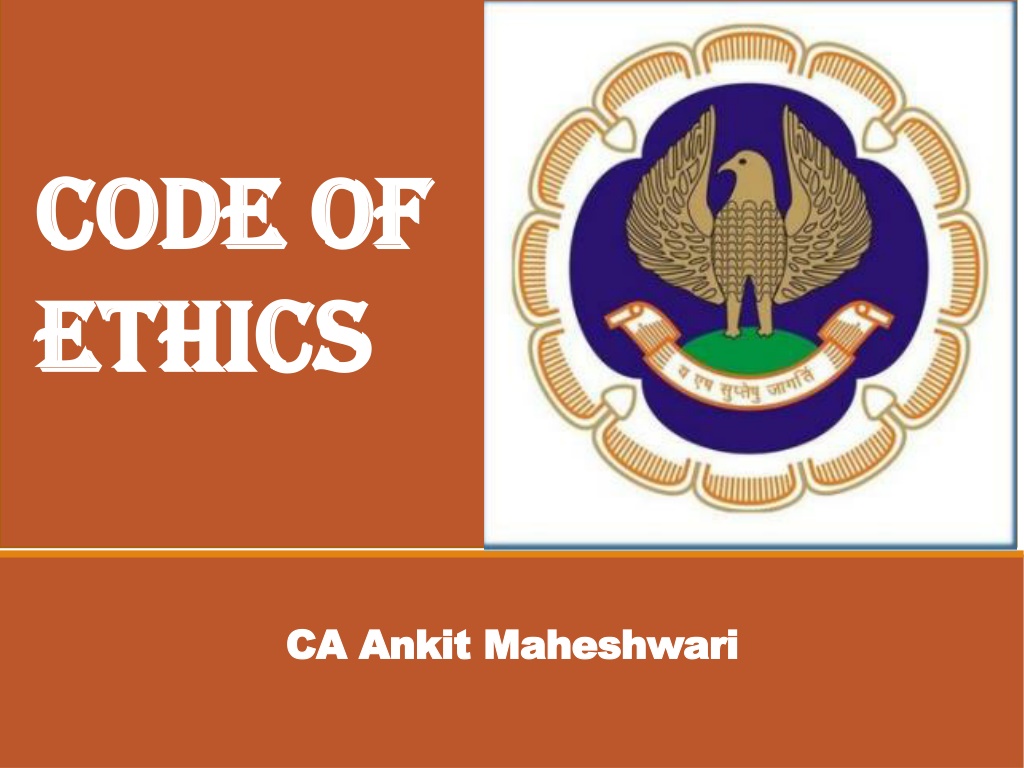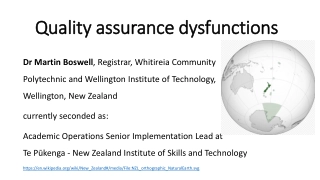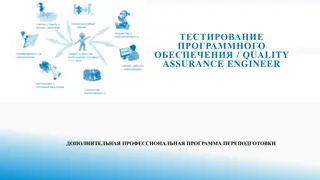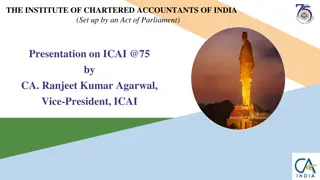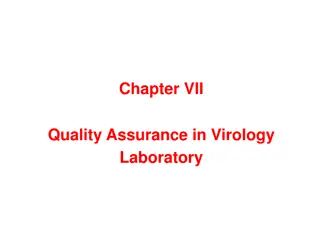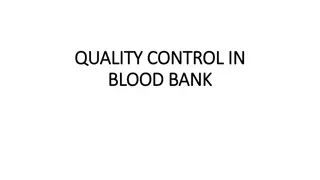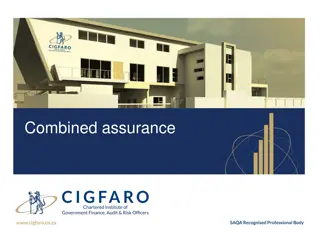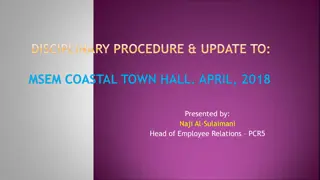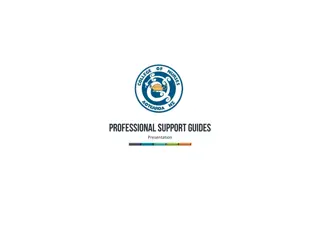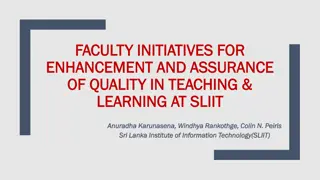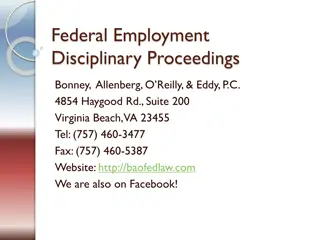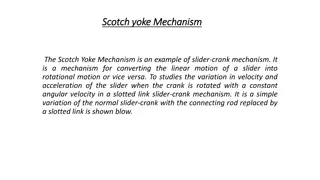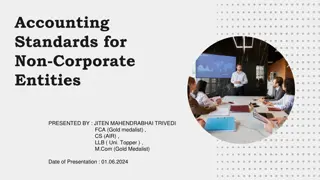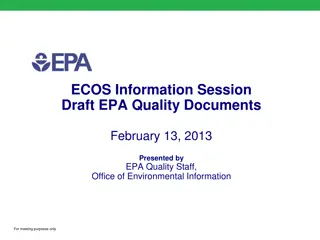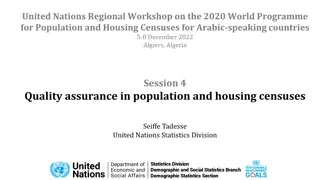Overview of Ethics, Quality Assurance, and Disciplinary Mechanism in ICAI
This information covers the Code of Ethics, Quality Assurance Mechanism, and Disciplinary Mechanism in the Institute of Chartered Accountants of India (ICAI). It includes details on the ethical standards, peer review boards, disciplinary procedures, and who can file complaints. Additionally, it highlights the recent amendments in the Chartered Accountants, Cost and Works Accountants, and Company Secretaries (Amendment) Bill, 2021.
Download Presentation

Please find below an Image/Link to download the presentation.
The content on the website is provided AS IS for your information and personal use only. It may not be sold, licensed, or shared on other websites without obtaining consent from the author. Download presentation by click this link. If you encounter any issues during the download, it is possible that the publisher has removed the file from their server.
E N D
Presentation Transcript
CODE OF CODE OF ETHICS ETHICS CA Ankit Maheshwari CA Ankit Maheshwari
Quality Assurance Mechanism in ICAI Quality Review Board (QRB) Set up by Section 28A of CA Act Financial Reporting and Review Board (FRRB) Non Standing Committee of ICAI. Peer Review Board (PRB) Non Standing Committee of ICAI. Taxation Audits Quality Review Board Non Standing Committee of ICAI. 2
Code of Ethics ICAI being member of International Federation of Accountants (IFAC) has considered the Ethics standards issued by International Ethics Standards Board for Accountants (IESBA) while framing Code of Ethics for CAs. The existing (2009) edition of ICAI Code of Ethics is based on 2005 edition of IESBA Code of Ethics. ICAI Code of Ethics has been revised in January, 2019 based on 2018 edition of IESBA Code of Ethics. It is applicable from 1st July, 2020. 3
Disciplinary Mechanism in ICAI 01 Disciplinary Directorate 02 Board of Discipline 03 Disciplinary Committee 04 Appellate Authority 4
Who can file? Users of audit reports/Certificates Others Statutory Authorities MCA RBI SEBI Banks & Financial Institutions Audits Projections Other Matters Fellow Brethren Investigation authorities Clients Companies/Firm other entities Central/State Government 5
THE CHARTERED ACCOUNTANTS, COST AND WORKS ACCOUNTANTS AND COMPANY SECRETARIES (AMENDMENT) BILL, 2021 Salient features of the Bill: a) Introduction of provision for making distinction between actionable and non-actionable complaints and information to be determined by the Disciplinary Directorate within 30 days of receipt of a complaint or information; b) Before taking a decision on whether a complaint or information is actionable or non- actionable, the complainant or informant is to be given fifteen days time to file additional documents, if any; c) Provision for appointment of at least two Joint Directors (Discipline) in the Disciplinary Directorates of the Institutes (not below the rank of Deputy Secretary of the Institutes) to deal with the disciplinary cases. d) Preliminary Examination Report (PER) to replace Prima Facie Opinion (PFO) by Director (Discipline) holding the respondent guilty or not guilty in his/her opinion; 6
THE CHARTERED ACCOUNTANTS, COST AND WORKS ACCOUNTANTS AND COMPANY SECRETARIES (AMENDMENT) BILL, 2021 e) Director or Joint Director {Discipline) to give opportunity to respondent to submit a written statement within twenty-one days which may be further extended by another twenty-one days on a specific request with reasons for seeking further extension. Rejoinder to be submitted by the complainant or the informant upon receipt of written submissions of the respondent within twenty-one days; f) Submission of PER by Director or Joint Director (Discipline) within 30 days upon receipt of written submissions and rejoinder, if any, if prima facie case is made out; g) Complaint filed by an authorized officer. of Government or statutory authority accompanied by an investigation report Or extract thereof along with supporting evidence is to be treated as PER. At present, the said complaints go through PFO route and are first examined by Director (Discipline). This would avoid delays in concluding inquiries in such cases at the preliminary stage; h) Non-actionable complaints and information to be submitted to Board of Discipline within 60 days of receipt. Board of Discipline may ask Director (Discipline) to re-examine the information or complaint; 7
THE CHARTERED ACCOUNTANTS, COST AND WORKS ACCOUNTANTS AND COMPANY SECRETARIES (AMENDMENT) BILL, 2021 i) Withdrawal of complaint not permitted at any stage; j) Appointment, re-appointment and termination of appointment of Director (Discipline) and Joint Director (Discipline) by the Council of the Institutes with the previous approval of the Central Government; k) Inclusion of Firms under the purview of Disciplinary Mechanism and a new chapter proposed for Registration of Firms with the Institutes; l) The Council shall continue to constitute Board(s) of Discipline (BoDs) and Disciplinary Committees. (DCs) as at present. However, the majority will be of non-members of the Institutes (commonly called as lay members) in these bodies. m) The present practice of direct nomination by the Central Government in the BoD and DCs is proposed to be discontinued. Instead, the Presiding Officers will be selected by the Central Government from out of a panel of suitable persons with experience in law, having knowledge of disciplinary matters and the profession and lay members will be selected from out of a panel of persons of eminence having experience in the field of law, economics, business, finance or accountancy. n) The presiding officers and lay members shall not be the members of the Institutes. The panels of non- members of Institute will be prepared and provided by the Councils of the Institutes. 8
THE CHARTERED ACCOUNTANTS, COST AND WORKS ACCOUNTANTS AND COMPANY SECRETARIES (AMENDMENT) BILL, 2021 o) Provision for more BoDs for quicker disposal of cases on the lines of DCs; p) Proposal to enhance the term of the Council of ICAI from 03 years to 04 years and maximum two consecutive terms of 04 years for a person in the Council; q) Enhancement in Penalties/Fines in case of misconduct; r) Autonomy to the Councils of the Institutes in the matter of fixation of fees; s) Provision to enable the Institutes to remove the name of the firms or members in case of non-payment of penalties; t) Disposal of Disciplinary Cases within 180 days by Disciplinary Committee and 90 days by Board of Discipline; u) Entire Disciplinary proceedings, since filing of complaint to be completed within 365 days; v) Audit of annual accounts of the Councils of the Institutes by a firm of chartered accountants to be appointed annually by the Councils from the panel of auditors maintained by the Comptroller and Auditor General of India; 9
Previous Code of Ethics Part-A - [Based on IFAC/IESBA Code of Ethics, 2005 edition] Chapter 1 General application of the Code Chapter 2 Professional Accountants in public practice Chapter 3 Professional Accountants in service Part B - [Based on domestic Indian provisions] Chapter 4 Accounting and Auditing standards Chapter 5 The Chartered Accountants Act, 1949 Chapter 6 Council Guidelines Chapter 7 Self Regulatory Measures Recommended by the Council Appendices A F 10
Structure of New Code of Ethics Part 1 (Applicable to all Professional Accountants) Complying with the Code, Fundamental Principles and Conceptual Framework Part 2 Professional Accountants in Business Part 3 Professional Accountants in Public Practice Parts 4 International Independence Standards Part 4A Independence for Audits & Reviews (Sec. 400 to 899) Part 4B Independence for Other Assurance Engagements (Sections 900 to 999) 11
Fundamental Principles 01 Integrity 02 Objectivity 03 Professional Competence and Due Care 04 Confidentiality 05 Professional Behaviour 12
Threats in Compliance of Fundamental Principles Self-interest threats Self-review threats Advocacy threats Familiarity threats Intimidation threats 13
Safeguards against the Threats Safeguards created by the profession, legislation or regulation include, but are not restricted to: (a) Educational, training and experience requirements for entry into the profession. (b) Continuing professional development requirements. (c) Corporate governance regulations. (d) Professional standards. (e) Professional or regulatory monitoring and disciplinary procedures. (f) External review by a legally empowered third party of the reports, returns, communications or information produced by a professional accountant. 14
Safeguards in the work environment: Compliance with the fundamental principles. Act in the public interest. To implement and monitor quality control of engagements. Identification and the application of safeguards. For assurance engagements - documented independence policies. To monitor and manage the reliance on revenue received from a single client. For Using different partners and engagement teams with separate reporting lines Timely communication of a firm s policies and procedures, including any changes to them, to all partners and professional staff, and appropriate training and education on such policies and procedures. Designating a member of senior management to be responsible for overseeing the adequate functioning of the firm s quality control system. Advising partners and professional staff of those assurance clients and related entities from which they must be independent. A disciplinary mechanism to promote compliance with policies and procedures. Published policies and procedures to encourage and empower staff to communicate to senior levels within the firm any issue relating to compliance with the fundamental principles that concerns them. 15
Engagement- specific safeguards in the work environment Involving an additional professional accountant to review the work done or otherwise advise as necessary. Consulting an independent third party, such as a committee of independent directors, a professional regulatory body or another professional accountant. Discussing ethical issues with those charged with governance of the client. Disclosing to those charged with governance of the client the nature of services provided and extent of fees charged. Rotating senior assurance team personnel. 16
Reduce Threats Accept Threat Evaluation Apply Safeguards Decline Not Possible to reduce Threats 17
Application of Conceptual Framework Professional Appointment Client Acceptance - Council Guidelines on KYC for Clients. Engagement Acceptance Whether engagement can be accepted? Changes in a Professional Appointment Communication with previous Auditors. Conflicts of Interest Second Opinions Fees and Other Types of Remuneration Marketing Professional Services Gifts and Hospitality Custody of Client Assets 18
Important Changes 2009 Code Revised Code No such provision Responding to Non-Compliance of Laws and Regulations (NOCLAR) Restrictions on Taxation services to Audit clients No prohibition on Taxation services to Audit clients No such provision Prohibition on Management Responsibilities to the audit clients Recommendatory 40% restriction on Fees from an audit client No such provision 15 % restriction on Fees from single client only if it is consecutively for 2 years and duty only to communicate TCWG Duty of Accountant in case of unintentional breach of Independence Standards Independence requirements for Audit and Review Engagements and other Assurance engagements differentiated Independence for Assurance Engagements Independence sections re-characterized as International Independence Standards No characterization as Standards Change in the drafting conventions e.g. should to shall Use of Should New pattern of structuring of sections Requirements distinguished Increased clarity of responsibility for compliance - Firms, network firms, individuals within firms No such restructuring of Sections Lack of clarity for each entity 19
NOCLAR S.360 Non-Compliance with Laws and Regulations While providing a professional service to a client or for an employer, a Professional Accountant may come across an instance of non- compliance with laws and regulations (NOCLAR) or suspected NOCLAR committed or about to be committed by the client or the employer, or by those charged with governance, management or employees of the client or employer. Have direct effect on the determination of material amounts and disclosures in the financial statements Compliance of which fundamental to the entity s business Compliance necessary to avoid material penalties. 20
Examples: Fraud, corruption and bribery, Money laundering, terrorist financing and proceeds of crime Securities markets and trading, Banking and other financial products and services Data protection, Environmental protection, Public health and safety Tax and pension liabilities and payments Following matters are not in scope of NOCLAR: Clearly inconsequential Personal misconduct unrelated to the business activities Non-compliance other than by the client or employer 21
Applicability of NOCLAR For now, limited application of NOCLAR has been prescribed in Code of Ethics as against comprehensive application of NOCLAR to all assignments/employees in the IESBA Code. Applicable only to listed entities. Applicable to only audit assignments. In case of Pas in service, applicable to employees (Senior Management) of listed entities. 22
Taxation services to the Audit clients ICAI Code Ethics, 2009 Taxation to Audit client include compliance, planning, provision of formal taxation opinions and assistance in the resolution of tax disputes. Such assignments are generally not seen to create threats to independence. ICAI New Code of Ethics Providing tax services to an audit client might create a self review or advocacy threat Tax Return preparation Usually no threat Tax Calculations for the Purpose of Preparing Accounting Entries- Self- review threat Tax Planning / Other Tax Advisory Services Self Review / Advocacy threat Tax Services Involving Valuations- Self Review threat Assistance in the Resolution of Tax Disputes - Self Review / Advocacy threat 23
Fees Where for two consecutive years, total gross annual professional fees from the audit client and its related entities represent more than 40% of total fees, the firm shall disclose to ICAI Note: No such ceiling on total fees of the Firm would be applicable where such fees does not exceed Rs.20 Lakhs. No such ceiling on the total fees would be applicable in the case of audit of Government Companies, public undertakings, nationalized banks, public financial institutions or Government appointments. 24
Part I of First Schedule Professional Misconduct in relation to Chartered Accountants in practice Clause (1): Allowing Non CA to practice in his name. Clause (2): Sharing Fees or Profits with Non CA. Clause (3): Receiving share in Profits from Non CA. Clause (4): Entering in Partnership with Persons other than CAs in practice Clause (5): Securing Professional Business by non-permitted means Clause (6): Solicitation of Professional Work Clause (7): Advertisement of Professional and Other Achievements Clause (8): Non Communication with Previous Auditor Clause (9): Accepting Audit Appointment without ascertaining Company Law compliance Clause (10): Charging Fees on the basis of Percentage or Contingencies Clause (11): Engaging business/occupation other than CA Clause (12): Allowing Persons other than practicing CA to sign on his behalf 25
Part II of First Schedule Professional Misconduct in relation to Chartered Accountants in service Clause (1): Sharing Emoluments Clause (2): Accepting part of Fees etc from Professional engaged by Employer Company 26
Part III of First Schedule Professional Misconduct in relation to Chartered Accountants (in general) Clause (1): Not being a fellow of the Institute, acts as a fellow of the Institute. Clause (2): Does not supply the information called for, or does not comply with the requirements asked for, by the Institute, Council or any of its Committees, Director (Discipline), Board of Discipline, Disciplinary Committee, Quality Review Board or the Appellate Authority; Clause (3): While inviting professional work from another chartered accountant or while responding to tenders or enquiries or while advertising through a write up, or anything as provided for in items (6) and (7) of Part I of this Schedule, gives information knowing it to be false. 27
Part IV of First Schedule Other misconduct in relation to members of the Institute generally Clause (1): is held guilty by any civil or criminal court for an offence which is punishable with imprisonment for a term not exceeding six months; The members who are held guilty by a Court of law for an offence punishable upto six months in person are also liable for misconduct. Clause (2): in the opinion of the Council, brings disrepute to the profession or the Institute as a result of his action whether or not related to his professional work. The Council has been empowered to opine on any action of a member which brings the Institute or profession in disrepute as misconduct. 28
Part I of Second Schedule Professional misconduct in relation to chartered accountants in practice Clause (1): Disclosure of information without consent of Client Clause (2): Submitting Report without verification of Financial Statements Clause (3): Certifying Estimated Earnings Clause (4): Audit of Concern in which having substantial interest Clause (5): Failure to disclose material facts Clause (6): Failure to report material misstatement Clause (7): Grossly Negligent Clause (8): Failure to obtain sufficient information Clause (9): Failure to report material departures in accounts Clause (10): Failure to keep client s money in separate A/c or using the same for it s purpose 29
Part II of Second Schedule Professional Misconduct in relation to Members of the Institute generally Clause (1): Contravenes any of the provisions of this Act or the regulations made thereunder or any guidelines issued by the Council. Clause (2): Being an employee of any company, firm or person, discloses confidential information acquired in the course of his employment except as and when required by any law for the time being in force or except as permitted by the employer; Clause (3): Includes in any information, statement, return or form to be submitted to the Institute, Council or any of its Committees, Director (Discipline), Board of Discipline, Disciplinary Committee, Quality Review Board or the Appellate Authority any particulars knowing them to be false; Clause (4): Defalcates or embezzles moneys received in his professional capacity. 30
Part III of Second Schedule Other Misconduct in relation to members of the Institute generally A member of the Institute, whether in practice or not, shall be deemed to be guilty of other misconduct; If he is held guilty by any civil or criminal court for an offence which is punishable with imprisonment for a term exceeding six months. If a member of the Institute, whether in practice or not, is held guilty by any Court for any offence which is punishable with imprisonment for more than six months, he shall be held guilty of misconduct under this Clause. 31
Recent Important Announcements / Clarifications - A CA Firm may register itself on Udyog Aadhar. - No prohibition for internal auditor of a company to acquire/purchase shares of the said Company. - It is not permissible for a member to use WhatsApp to send messages to make people aware about his practice, and mention the services provided therein. - A Chartered Accountant in practice being Director Simplicitor in a Company cannot sign ROC Forms of the Company as it is a direct conflict of role. - A Chartered Accountant in practice can act as Authorized Representative of a Foreign Company, provided he is not the auditor of the said Company. 32
- Two or more CA in practice collectively can have joint training session for their clients on GST, and share the fees collected from the clients thereof. - CA in practice can provide services through kiosk only if the services provided are professional activities of a practicing chartered accountant, permitted under the Act. - Where CA in practice is a non-executive director in a company, he or a Firm in which he is a partner, should not accept the appointment as a statutory auditor of a Company which is a joint venture of the original Company, as it would impact independence. - CA in practice may be equity research adviser, but he cannot publish retail report, as it would amount to other business or occupation. 33
- CA who is member of Trust, cannot be the auditor of the said trust. - CA in practice may engage himself as Registration Authority (RA) for obtaining digital signatures for clients. - CA can hold the credit card of a bank when he is also the auditor of the bank, provided the outstanding balance on the said card does not exceed Rs.10,000 beyond the prescribed credit period limit on credit card given to him. - CA in practice is not permitted to accept audit assignment of a bank in case he has taken loan against a Fixed Deposit held by him in that bank. - CA cannot exercise lien over the client documents/records for non- payment of his fees. 34
- It is not permissible for CA Firm to print its vision and values behind the visiting cards. - It is not permissible for CA in practice to take agencies of UTI, GIC or NSDL. - It is permissible for a member in practice to be a settlor of a trust. - Members in practice engaged in Coaching/Teaching activities are advised to abstain from advertising their association with Coaching /teaching activities through hoardings, posters, banners and by any other means. - KYC Norms are mandatory in nature and shall apply in all assignments pertaining to attest functions. - The member /Firm can conduct training through seminars etc. on GST but only invite its existing clients to such training programmes. 35
- CA can send write-up on GST only to existing clients, and to a proposed client if an enquiry was received from the proposed client with regard to the same. - It is not permissible for a CA to mention himself as GST Consultant. - A member can share GST updates, mentioning himself as CA with individual name, provided the communication is limited to providing updates. Mention of Firm name is not allowed. - Member can publish testimonials /appreciation letters received by him with regard to GST Training assignments on CA Firm website, but not on social media like Facebook, Linkedin etc. - GST training can be provided to the existing clients. In case of non- clients, training can be provided only if the member is invited to provide such training. 36
Acknowledgement Acknowledgement Thanks to the, all participants and coordinators, for their co- operation, support. Contact details: CA. Ankit Maheshwari 616,Elemenets Mall, Ajmer Road, Jaipur 302019 Phone: 8094869000 (M) Email id: info@caankitmaheshwari.com
